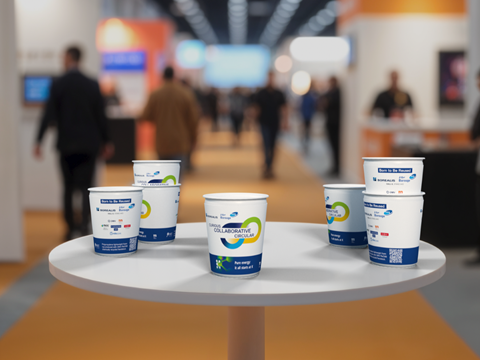
At K 2025, Borealis will distribute a deposit-free reuse system for cups made from modified polypropylene for foam, utilizing chemically recycled feedstock from OMV’s ReOil technology.
This is believed to be the first time the Messe Düsseldorf exhibition centre will offer a comprehensive system for reusable cups, which will operate at every restaurant and bar serving drinks at this year’s K Fair.
According to Borealis, its cups are material-efficient and lightweight, and fully recyclable at end-of-life.
Visitors will not be expected to pay a deposit for their purchases. Special collection containers will be installed for visitors to return their cups; these will be retrieved, rinsed in on-site kitchens, and returned to circulation. Empty cups left on tables will undergo the same process.
Alternatively, consumers can return their cups to service points or take them home for further reuse. Any cups thrown into general waste bins are set to be collected and recycled by Borealis, while unused cups will be donated for future use.
The initiative is set to serve as a pilot for a scalable reuse system. Messe Düsseldorf will track usage patterns, cup consumption, and reuse and recycling rates; these insights will be used to bring the solution to future events.
The initiative is also anticipated to contribute to Packaging and Packaging Waste Regulation targets.
Additional partners have contributed to the integration of durable in-mould labels and the production of the reusable cups.
Arburg specializes in manufacturing high-end injection moulding machines and turnkey systems for plastics processing, while Miko Pac works to innovate plastic packaging solutions for a range of industries, including foodservice.
Bockatech’s EcoCore foaming technology has been used to produce the injection-moulded cups. Apparently, the technology cuts down on plastic consumption by up to 50% and ensures the cups are recyclable at end-of-life.
At the same time, it claims to reduce manufacturing time while doubling the cups’ thermal insulation and increasing their strength fivefold.
MMC Global IML also targets innovation and circularity in its production of in-mould labels for rigid plastic packaging.
“At Borealis, we are committed to creating innovative solutions in collaboration with our value chain partners and this initiative is a prime example,” says Peter Voortmans, Borealis vice president Marketing Consumer Products.
“Reuse systems are key to making large-scale events more sustainable, and our polypropylene solutions for foam support this by enabling lightweight, durable, and fully recyclable applications that use less material than conventional alternatives.”
“ReOil is our proprietary chemical recycling technology that converts end-of-life plastics into circular feedstock for the production of chemicals, in particular new plastics,” explains Maximilian Grasserbauer, OMV Senior Vice President Circular Economy.
“We operate ReOil at our Schwechat refinery close to Vienna, Austria, and are continuously investing in advancing this technology to ensure a reliable supply of circular feedstock for the market.
“ReOil is part of our sustainable base chemicals portfolio, designed to support our industry’s shift toward circular feedstocks.”
Thomas Franken, K director, Portfolio Plastics and Rubber, Messe Düsseldorf, adds: “Introducing reusable cups to replace single-use cups at K 2025 aligns perfectly with our motto, ‘The Power of Plastics! Green – Smart – Responsible.’
“As the global forum shaping the future of plastics, K 2025 provides the ideal platform to highlight practical initiatives that reflect the industry’s commitment to sustainability – while also supporting Messe Düsseldorf’s own sustainability goals.”
Earlier this year, Closed Loop Partners published the results of its Petaluma Reusable Cup Project trial. Over thirty restaurants in the City of Petaluma served takeaway drinks from The Coca-Cola Company, Starbucks, PepsiCo, and other big brands in reusable cups as the default; over 220,000 cups were reportedly returned across the twelve-week programme, with participants said to achieve a 51% return rate.
Borro has also developed a ‘frictionless’ reuse system for beverage cups served at events. Thought to be ‘as easy as single-use’, its app-free, QR-driven return process is intended to improve return rates and consumer satisfaction in a simpler, less expensive, and less time-consuming process.
If you liked this story, you might also enjoy:
The ultimate guide to the Packaging and Packaging Waste Regulation in 2025
How are the top brands progressing on packaging sustainability?
Everything you need to know about global packaging sustainability regulation in 2025
The key to increasing the use of reusable packaging in supermarkets














No comments yet